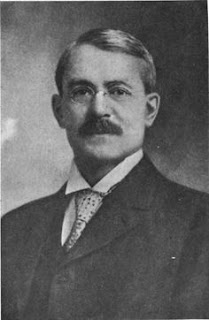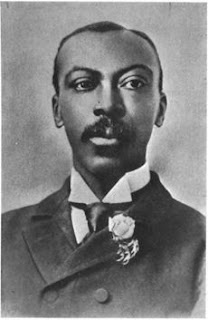Hey Cooper Cummings Family! If you attended our Virtual Family Reunion, you heard the 5-second synopsis of Sydney Borden Scott’s time at Atlanta Baptist College - this blog post fills in the details (as best I understand them).
Sydney Borden Scott, or Borden, as he seems to have preferred, was the younger half-brother of my 2x great-grandmother Scoatney Scott Cooper. She was born in the early years of the Civil War, he about 20 years later. Both seem to have been the children of cotton country, and of the people whose unpaid labor had made that crop so profitable. But whereas she remained in rural Georgia, marrying, having children and even owning land, he left on a path that took him through Atlanta, Georgia all the way to Chicago, Illinois, and to a career as a physician and postal clerk. She planted her roots more deeply, while he, in a sense, uprooted his.
I am fascinated by the dichotomy of their stories – and frankly by the sheer variety of experiences all of the Scott children seemed to have had – and I’ve spent my past few posts working to lay out what I know specifically about Borden for you all. I pick up the story here, by finally – finally! – getting to the meat of Borden’s experiences at Atlanta Baptist Seminary/Atlanta Baptist College, which would later become Morehouse College.
~ ~ ~
The Scene
The red brick building of Atlanta Baptist Seminary sat towards the center of a 14-acre property on the outskirts of Atlanta’s West End neighborhood. Four stories tall and decorated with white marble, it would have been the dominant feature of the property, with a boiler house standing nearby to provide its classrooms, dorms, laboratory, printing office and 2,000-book library with heat. In a landscape with few trees, it would have been an impressive, perhaps even imposing, sight. Borden Scott studied here from at least 1897, at the age of about 17, until 1901. He may have arrived to begin his first year in 1894, at the age of 14. From whatever his start date, he graduated twice, taking both the Academic and the College Course.
 |
| Atlanta Baptist Seminary, 1895 or before. See credit below. |
 |
| Atlanta Baptist College on a Sanborn Fire Insurance Map, ca. 1899. See credit below. |
The Arrival
If school records are correct, Borden would have travelled to Atlanta Baptist Seminary from Sparta, Georgia, population under 2,000. The school was on the western outskirts of Atlanta, but the city itself had a population upwards of 65,000 people. I wonder if he had been there before? Passing through or around the city, would the magnitude of difference have been overwhelming? Exciting? Both?
Then I imagine him a few years younger – around the age of 14. If he enrolled at the very start of the Academic Course, this is when he would have begun his time at the Seminary, in 1894. And because Sparta was almost 100 miles away, Borden would likely have arrived as a boarding student, unless he had family to stay with in Atlanta. Would he have been scared? Or ready for a new adventure?
The School
Atlanta Baptist Seminary was described by school leadership as “emphatically a Christian school.” The school had been founded by ministers and it was supported by the American Baptist Home Missionary Society, an organization which… Leaders aimed to “send forth consecrated workers,” preferably towards the ministry, as its name suggested. But as a school catering to young men of African descent – and one that had been founded for newly-freed people just after the Civil War’s end - the larger mission was for the uplift of the race. While Borden studied there, students could take a 4-year Academic Course, an Elementary English Course, or the more advanced English Theological Course or Teacher’s Professional Course.
Classes were led by well-trained educators, both male and female, black and white. Borden would likely have seen President George Sale in the chapel, perhaps borrowed a book from Professor and Librarian William E. Holmes, and encountered Carrie E. Bemus, Superintendent of the Practice School, walking the grounds. Professor Dr. John Hope, who would become the school’s first Black President, would have been a familiar sight as well.
 |
| President George Sale |
 |
| Superintendent Carrie E. Bemus |
 |
| Professor William E. Holmes |
 |
| Professor/President John Hope |
He would have taken classes in the Science Lab (and maybe even used the telescope), perused specimens in the Museum, studied in the Library and Reading Room, and might have visited friends in the Printing Office, where the monthly bulletin and the annual catalogue were printed by students. All of these spaces, plus the dormitories, dining hall, and other classrooms, were contained in just one building, soon to be known as Graves Hall; the cornerstone of a second was laid during commencement exercises in 1898, the year Borden graduated from the Academic Course. This new building, Quarles Hall, would allow Borden and his classmates from Atlanta Baptist College, as well as the female scholars from Spelman Seminary, to take collegiate classes, and featured “toilet rooms and every modern convenience for teachers and students.”
Getting In and Staying In
In order to be admitted, Borden would have needed to “furnish satisfactory testimonials respecting [his] moral character and habits," a requirement befitting a an avowedly Christian school. He would also have needed to be ready for or prepared to rise to the rigorous academics of the school, and, of course, be able to pay his way.
As a student in the Fourth Year Academic Course, the earliest for which we have proof of his attendance, Borden and his 11 classmates would have taken classes in English Literature, Latin Grammar and Literature, Introductory Greek, Bible Study, Introductory Mechanics and Chemistry, and General History. As a college student, things would have become more complex:
 |
| All images from Catalogue of Atlanta Baptist College, 1897/98 - 1911/12. |
Somehow, Borden managed to condense or skip several of these requirements – he began his college course during the 1898-1899 school year and graduated at the end of the 1900-1901 school year, just three years later.
So what did this experience cost? Eleven dollars and fifty cents per month in 1897, including board, fuel, light and washing or, if you were willing to perform an hour of work per week for the school, just $10. But either way, you were expected to bring your own towel and table napkins.
 |
| Students working on school grounds. Image credit below. |
Still, like today, there were several
financial aid options: you could do additional work in the building or on
school grounds, receive a grant (in exceptional cases) or earn a scholarship.
In fact, in his Fourth Year, Borden did just that. He earned $100, and would have split the payments up over each year of his college experience.
 |
| Catalogue of Atlanta Baptist College, 1897/98-1911/12. |
For context on why it says A.S. Scott, see my previous post.
The Students
 |
| B.G. Brawley |
Would they all have described their experience as such? Would Borden? Who knows, but it’s an interesting perspective on his time there!
~ ~ ~
There’s so much more I could write about Borden’s time at Atlanta Baptist Seminary / College, but I’ve written too much as it is! Suffice it to say, this young man from Sparta, Georgia, born to formerly enslaved parents, graduated from college in 1901. And his educational journey didn’t end there.
 |
| Graduates ca. 1895-1902. See credit below. |
Do you know something about Sydney Borden Scott’s time at Atlanta Baptist College? Please drop me a line in the comments!
A Note on Sources: I have pulled my information and images from a variety of materials, but the absolutely most helpful was the Catalogue of Atlanta Baptist College, 1897/98-1911/12, available through HathiTrust. It is a treasure trove of information from the official school perspective, and if you want to learn more about Borden’s time there, you should absolutely explore it!
Image Credits:
Atlanta Baptist Seminary, 1895 or before. This image appears in Art Work of Atlanta: Published in Twelve Parts, published in 1895. Accessed via Archive.org, uploaded by Emory University, Manuscript Archive and Rare Books Library.
Atlanta Baptist College on a Sanborn Fire Insurance Map, ca. 1899. This image was accessed via Digital Library of Georgia, GALILEO, Sanborn Fire Insurance Maps for Georgia Towns and Cities, 1884-1922.
Image of President George Sale. From History of Morehouse College, by Benjamin Griffith Brawley, accessed via HathiTrust.
Image of Superintendent Carrie E. Bemus. Same as above.
Image of Professor William E. Holmes. Same as above.
Image of Professor/President John Hope. Wikimedia. Originally from The Crisis, Vol. 8, No. 1, May 1914.
Image of Benjamin Griffith Brawley. Wikipedia.
Students Working on School Grounds. Schomburg Center for Research in Black Culture, Jean Blackwell Hutson Research and Reference Division, The New York Public Library. "Atlanta Baptist Seminary" New York Public Library Digital Collections. http://digitalcollections.nypl.org/items/510d47df-a0fb-a3d9-e040-e00a18064a99
Graduates of Atlanta Baptist College and Spelman Seminary, ca. 1895-1902. Schomburg Center for Research in Black Culture, Manuscripts, Archives and Rare Books Division, The New York Public Library. "Graduates of Atlanta Baptist College and Spelman Seminary." New York Public Library Digital Collections. http://digitalcollections.nypl.org/items/510d47df-9443-a3d9-e040-e00a18064a99




No comments:
Post a Comment